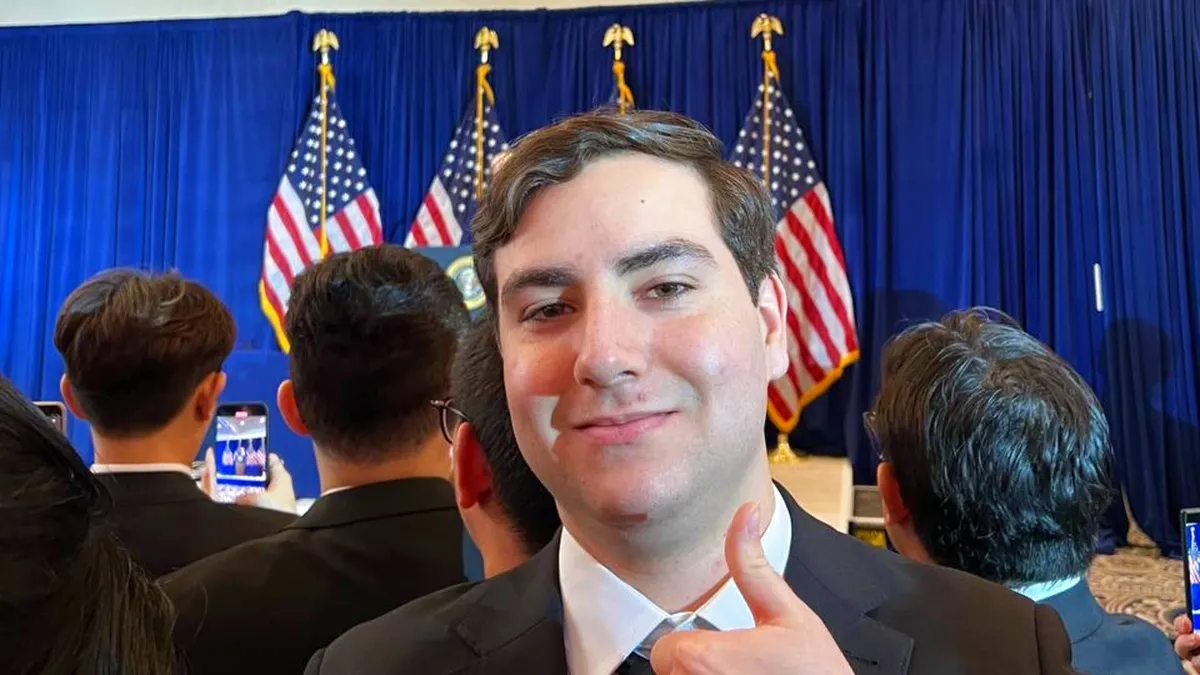
On Friday morning, the price of President Donald Trump's meme coin experienced a significant drop of 16%, just hours after he hosted an extravagant black-tie gala at his Virginia golf club. This exclusive event attracted an elite crowd of investors who collectively spent an astonishing $148 million on the token, making it one of the most coveted invitations in the cryptocurrency world. Among the 220 attendees were notable figures from the crypto industry, including crypto influencers, executives like Sandy Carter from Unstoppable Domains, and former NBA star Lamar Odom, who took the opportunity to praise Trump and promote his own token, $ODOM.
The gala promised a lavish experience, particularly for the top 25 token holders who were promised a private reception and a guided tour. However, for some attendees, such as 25-year-old Nicholas Pinto, the experience fell short of expectations. Pinto, who arrived in a Lamborghini, expressed disappointment with the food and drink options, stating, "The food sucked," and noted that he was only provided with water and a single glass of Trump's wine. He remarked that Trump made a brief appearance, lasting only 23 minutes, during which he delivered a short speech reiterating familiar cryptocurrency talking points before departing via helicopter without engaging with guests.
The event showcased immense wealth, with attendees flaunting luxury items, including Richard Mille watches. Pinto observed that at least 16 guests were wearing these high-end watches, a sight he usually associates with upscale venues in Miami or Dubai. However, he noted that the atmosphere was more subdued than anticipated, with many attendees frequently checking their phones for updates on the coin's price rather than fully engaging in the festivities.
The gala raised eyebrows among lawmakers and regulators, particularly due to the presence of Justin Sun, a Chinese-born crypto mogul and the top holder of the $TRUMP token. Sun, who holds over $22 million in $TRUMP and an additional $75 million in World Liberty Financial's native token, recently faced Securities and Exchange Commission fraud charges. His attendance and substantial holdings have intensified scrutiny surrounding the event. Outside the venue, approximately 100 protesters gathered, including Senator Jeff Merkley from Oregon, advocating for the new End Crypto Corruption Act.
Rep. French Hill, a Republican from Arkansas, expressed concern over how the Trump family's involvement in the meme coin space complicates legislative efforts. He highlighted that the gala could distract from critical negotiations on bipartisan stablecoin legislation, particularly the GENIUS Act. This act is currently at risk, especially after Senator Josh Hawley introduced a controversial provision that could hinder its progress.
On the same night as the gala, a group of Senate Democrats announced their intention to propose a ban on presidents and senior officials profiting from cryptocurrency ventures while in office. This move directly challenges Trump's involvement with the USD1 stablecoin, launched earlier this spring. As political tensions rise, there are growing concerns that infighting over these crypto ventures could derail stablecoin legislation altogether, potentially jeopardizing the U.S.'s position in the global digital payment race.
The White House has attempted to separate Trump the president from Trump the businessman, with Press Secretary Karoline Leavitt emphasizing that the gala was a personal event, not an official White House function. However, the lack of transparency regarding the guest list has raised further questions. A Bloomberg News analysis revealed that most of the top wallets were linked to foreign exchanges, which are typically off-limits for U.S. users.
Despite these controversies, David Sacks, the White House's AI and crypto czar, remains optimistic about bipartisan support for stablecoin legislation. He noted that the market already contains over $200 billion in stablecoins, albeit unregulated. Sacks believes that providing legal clarity could significantly increase demand for U.S. Treasurys.
The Trump gala has not only highlighted the extravagant lifestyle associated with the cryptocurrency elite but also brought to the forefront significant regulatory concerns and political challenges. As the market evolves, the implications of these events could shape the future of cryptocurrency regulation in the United States and beyond.